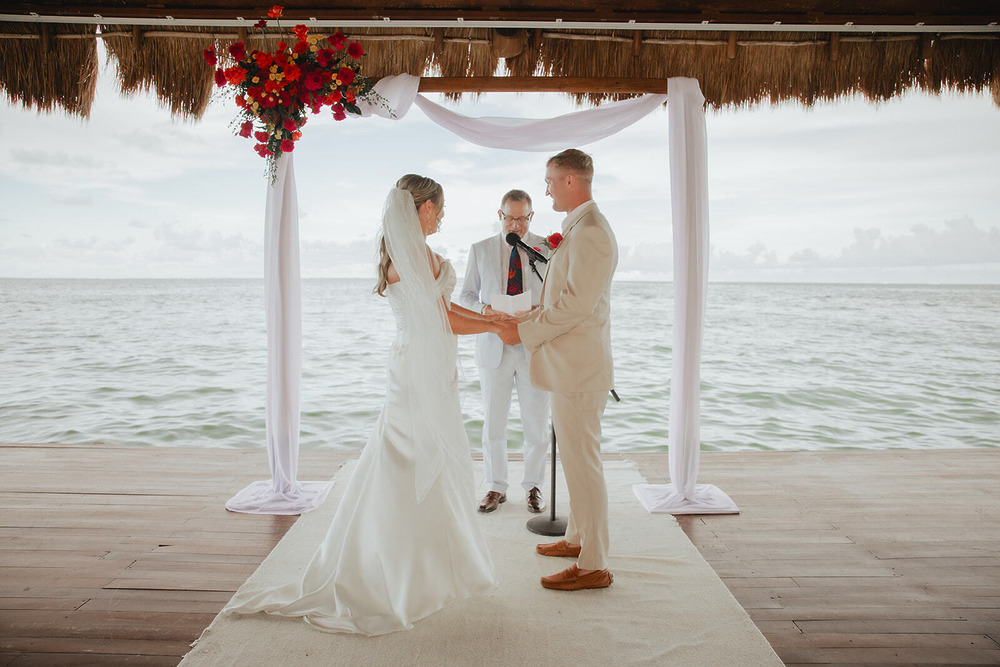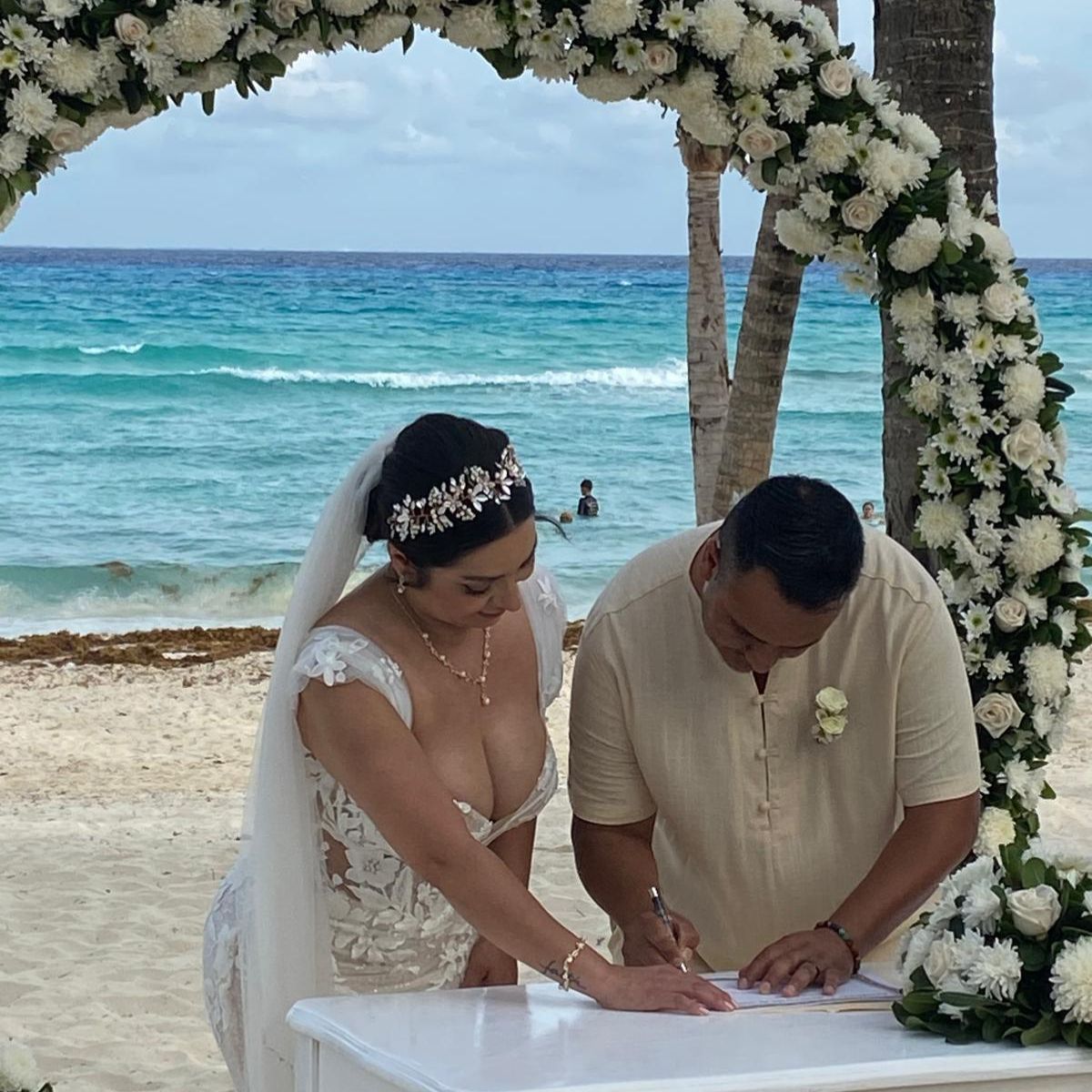Table of contents
- 0.1 TL;DR: Symbolic vs. Legal Wedding Ceremonies
- 0.2 What is a Symbolic Wedding Ceremony?
- 0.3 What is a Legal Wedding Ceremony?
- 0.4 Symbolic vs. Legal Wedding Ceremony: Key Differences
- 0.5 Other Ceremony Types You May Hear About
- 0.6 Destination-Specific Legal Considerations
- 0.7 Symbolic Marriage Certificates vs. Legal Documents
- 0.8 Why Couples Choose Symbolic vs. Legal
- 1 Symbolic Ceremonies
- 2 Legal Ceremonies
- 3 Symbolic vs. Legal Ceremonies
TL;DR: Symbolic vs. Legal Wedding Ceremonies
A symbolic wedding ceremony celebrates your love without the legal paperwork—it’s all about the emotion and meaning. A legal wedding ceremony, on the other hand, is recognized by the government and requires official documents like a marriage license.
Quick summary:
- Symbolic = non-legally binding, flexible, highly personalized.
- Legal = binding, requires paperwork and government recognition.
- Costs and requirements vary by destination.
- Some countries (like Mexico or Jamaica) make legal ceremonies easier than others.
- Many couples marry legally at home, then host a symbolic wedding abroad.
What is a Symbolic Wedding Ceremony?
A symbolic wedding ceremony—sometimes called a commitment ceremony or promise ceremony—is a non-legally binding celebration led by a celebrant or officiant. It focuses entirely on love, vows, and personal meaning rather than government paperwork.
Why couples choose symbolic weddings:
- Less paperwork for destination weddings abroad.
- Freedom to customize every element, from vows to rituals.
- Ideal for same-sex couples or those facing legal restrictions abroad.
- Great for couples already married legally at home.
Common rituals include handfasting, lighting a unity candle, or a sand ceremony, blending colors to symbolize unity.
👉 Related: Why Choose to Have a Destination Wedding
What is a Legal Wedding Ceremony?
A legal wedding ceremony (or civil ceremony) is officially recognized by the government, creating a binding marriage in the eyes of the law. It requires a marriage license, an authorized officiant (judge, notary, or minister), and compliance with local legal requirements.
Typical documents include:
- Valid passports
- Birth certificates
- Marriage license
- Occasionally: blood tests or translations (depending on the country)
💡 Destination Note:
- Mexico requires translations and blood tests.
- Jamaica offers a simpler process recognized worldwide.
- Dominican Republic requires documentation but offers full legal recognition.
Symbolic vs. Legal Wedding Ceremony: Key Differences
| Aspect | Symbolic Ceremony | Legal Ceremony |
|---|---|---|
| Definition | Non-legally binding celebration | Government-recognized marriage |
| Paperwork | None required | License, ID, official documents |
| Cost | Lower (no legal fees) | Higher (documents, translation) |
| Officiant | Celebrant or family member | Judge, notary, or minister |
| Flexibility | Fully customizable | Must follow legal format |
| Recognition | Not legally recognized | Recognized worldwide |
| Rituals | Sand, unity candle, handfasting | Optional, depends on jurisdiction |
In short: A symbolic wedding gives you freedom; a legal ceremony gives you formal recognition.
Other Ceremony Types You May Hear About
- Civil Ceremony: Non-religious but legally binding, performed by a judge or registrar.
- Religious Ceremony: Performed by clergy in a church, mosque, or temple; legal status varies by country.
- Spiritual Ceremony: Personal, non-legal celebration focusing on energy, faith, or culture.
👉 Related: Religious vs. Civil Weddings Explained
Destination-Specific Legal Considerations
Each destination has unique wedding laws that can affect whether your ceremony is symbolic or legal:
- Mexico: Legal weddings require blood tests, translations, and extra documentation—many couples opt for symbolic ceremonies here.
- Dominican Republic: Legal weddings are recognized abroad but need advance paperwork.
- Jamaica: One of the easiest destinations for legal weddings abroad—no residency requirement.
- United States: Marriage licenses vary by state; always confirm ID and residency rules.
👉 Related: Legal Wedding Requirements by Destination
Symbolic Marriage Certificates vs. Legal Documents
A symbolic marriage certificate is a keepsake, not a government-issued record. It looks beautiful in photos but holds no legal weight.
A legal marriage certificate, however, is the proof of your union—used for name changes, taxes, visas, and other rights.
Marriage license vs. certificate:
- License = Permission to marry.
- Certificate = Proof of marriage afterward.
Why Couples Choose Symbolic vs. Legal
Couples may choose symbolic weddings abroad for ease and personalization, or legal weddings for formal recognition.
Top reasons to go symbolic:
- Avoid complex foreign paperwork.
- Create a stress-free, romantic experience.
- Celebrate inclusivity for same-sex couples in restricted countries.
- Save money and time abroad.
Top reasons to go legal:
- One wedding event covers all.
- Immediate recognition for visas or name changes.
👉 Related: Symbolic Weddings vs Legal Ceremonies: Which Is Right for You?
One of the most common questions a couple asks our travel experts is to share the difference between ceremony types. A legal ceremony is a civil or religious ceremony that is recognized by a country or government. A symbolic ceremony is a ceremony that is not legally binding but is significant to the couple getting married.
The purpose of a legal ceremony is to make the marriage official in the eyes of the law. The couple must obtain a marriage license from the government, and the officiant must be authorized to perform marriages in the state in which the ceremony is taking place.
Some couples choose a symbolic ceremony because they want to have a more personal and intimate ceremony that is not regulated by the government.
When planning a symbolic ceremony, it is important to consider what the ceremony will mean to the couple and what they want to include in it. It is also important to choose an officiant who is willing to customize the ceremony to the couple’s preferences.
We find the majority of our couples prefer legal ceremonies at home and then hosting a symbolic ceremony on site. Technically speaking, symbolic ceremonies have much fewer loopholes to jump through to have your destination wedding, and can be much more cost-effective too. Follow below as we break down the two ceremony types:

Symbolic Ceremonies
Symbolic ceremonies allow couples a more affordable and hassle-free experience. Most often, couples get married in the U.S. state where they reside, like at the courthouse, and then simply bring proof of their marriage to their resort in order to have their wedding ceremony. Your wedding party won’t notice the difference, whether your ceremony is legal or symbolic, either way, unless it’s essential you sign your legal papers after you say, “I do”.
Symbolic Ceremonies are:
- – More affordable
- – Most popular
- – Same-sex friendly
- – Have the same ceremony
- – Use a non-denominational minister
There are a number of reasons why couples choose to have a symbolic ceremony as part of their destination wedding. Firstly, many couples like that they can keep costs down as they don’t have to go through the process of a legally binding marriage in a different country. Additionally, it gives the couple more freedom to focus on other aspects of the wedding, such as creating a unique ceremony with varying elements of culture and tradition.
Symbolic ceremonies also give couples a chance to be truly creative, picking and choosing elements of their personal faiths, cultural backgrounds, and lifestyles. Finally, the symbolic nature of the ceremony means you can plan and execute it the way you want to, and the setting of the wedding can be more easily tailored to the couple’s wishes.
Legal Ceremonies
Legal (or sometimes called Civil) ceremonies are less common when it comes to destination weddings. That’s because it means they are legally binding on the country you choose to get married in. They are necessary for Catholic weddings. Legal ceremonies have additional fees and requirements. For example, you may have to get bloodwork completed in your chosen destination and arrive a certain period of time before your ceremony.
Legal Ceremonies are:
- Legally binding and require notary fees
- Require extra legal fees
- May require documentation translation
- Performed by a judge
Top reasons, why couples may choose to opt for a legal marriage ceremony when they are planning a destination wedding, may include that couples want their ceremony documented, as well as ensuring full legal protection and compliance with laws in the destination country or state.
Getting officially married also ensures that couples have all the required legal paperwork for their marriage to be recognized globally. Additionally, for the bride and groom-to-be, it eliminates the potential stress of having multiple marriage ceremonies in the destination country and allows them to focus on celebrating and enjoying their special day.
We don’t typically recommend a legal ceremony unless you have national ties to the destination you’re getting wed in.
Symbolic vs. Legal Ceremonies
Either way, couples will need to arrive early at their chosen destination. For a symbolic ceremony, they may have to arrive a day or 2 before their ceremony. A legal ceremony may require 4+ days in advance.
For a legal ceremony, you may have to provide bloodwork, birth certificates, and additional paperwork. There is yet to be a destination of ours that allows for same-sex legal ceremonies, but this may change with upcoming laws that are being passed in Mexico.
The choice to have either a legal or a symbolic ceremony is a personal one and couples should consider their beliefs, preferences, and budget when making their decision. A legal ceremony is required for the marriage to be legally recognized, while a symbolic ceremony is not legally binding but provides the couple with a more personalized experience.
FAQs
Is a symbolic wedding legal?
No. It’s a non-legally binding wedding—a celebration only, not recognized by law.
Can same-sex couples have legal weddings in Jamaica or Mexico?
Jamaica: No, only symbolic.
Mexico: Yes, in many regions, but check local regulations.
Can you turn a symbolic wedding into a legal one later?
Yes. You can legally register your marriage afterward in your home country.
Ready to talk to a wedding expert and figure out which is right for you? Click here to get a quote.






